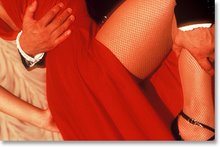Libertad Lamarque y Eva Perón,
Eva Perón was the paradigm of the political and revolutionary woman in the twentieth century, she was consecrated as a saint by his people and she is a myth recognized in all the world.
|
|
| Evita |
Both were intelligent, proud and with a strong personality.
Even though their origins seem quite different -Libertad came from a home with strong financial resources -, both were brought up and grew, having tango as their witness.
The singer had a meteoric and ascending artistic career in the tango milieu; the country town girl was helped by her friend Agustín Magaldi. To that we should have to add the support provided by the musician Ángel D'Agostino and the theater critic Edmundo Guibourg (friend of Carlos Gardel's) when she arrived in Buenos Aires carrying the luggage of her poverty on her shoulders.
They did not meet during the charity drive organized to raise funds for the victims of the earthquake in San Juan in the year 1944. Undoubtedly, the encounter took place during the shooting of the film "La cabalgata del circo", directed by Mario Soficci. What is true is that the famous incident between both women happened during that shooting.
The rumors of the period give us some of the three versions about the origin of the quarrel.
One, that it was of a sentimental nature, when the two women were rivaling because of love favors from the same man: Colonel Juan Perón.
|
|
| Libertad Lamarque |
Libertad herself is conclusive at this respect, when commenting this version she tells us: «...The result was that Eva and I were rivaling on Perón's favors; to even think of it makes me shiver... Who shall ever be able to clean the river of all the dirty water of slander!... Unpunished it will follow its course... and so, once more baseness shall triumph».
Then we would like to know, from Eva Duarte's point of view, if for any reason she was jealous of the diva and for that, she gave rise to the conditions that favored the happening of the incident.
There is another version of ideological nature that refers to the scorn that Libertad had for politics, and especially, for mass politics that at that time Colonel Perón displayed from his desk in the Department of Labor and Welfare. Following this possibility, it was logical to think that she considered Evita as a consequence of the régime, and what was worse, a "sinecurist". In her autobiography, the singer very often repeated: "I never reached the sun that warms you up the most".
|
|
| Libertad Lamarque and Juan D. Perón |
Lastly, the third version, is the one given by Libertad herself, telling us about Eva's informality, who, being an actress with a secondary role on the film, always arrived late or made the shooting stop for unimportant personal reasons. But what most hurt her were the frequent excuses that either the producer or the director allowed Evita, both giving her a preferential consideration because she was Perón´s girlfriend.
She as well, firmly denies the much-talked-about slap on Eva's face and she blamed it on the perverseness of her enemies. The truth is that popular fantasy and the gossiping spread by magazines furthered the story, describing it as an event that happened during the shooting of "La cabalgata del circo".
Parodying the eventual slapping, the singer ironically tells us: «I slapped her face!... And the helpless Eva, trembling in pain... held her face with her hand? And... please tell me, did she only answer by weeping? A tall strong woman against a short one like me? Will anyone explain this melodrama to me?»
It's really hard to believe, knowing Evita, that before an aggression of this kind she would resign herself to not answering back.
What she indeed recognizes and confesses is that she gave offense to her twice, when she disregarded the suggestion to invite her to tea, that Evita herself had suggested, first to Soffici and to Libertad´s sister later.
Fermín Chávez, in his book "Eva Perón en la historia", puts forward another vision of this mess: «During the shooting an incident between Duarte and Lamarque took place, it will be greatly exaggerated by Evita´s enemies. They said that Libertad had slapped Eva´s face, what would have given rise to an indelible hatred. This is not true; Soffici himself in an interview cleared out this lie. One day Evita arrived several minutes late for a shooting, then Libertad Lamarque, that was a much demanding professional and, at the same time, very strict with herself about time, reproached Eva her delay, and also blamed her for taking advantage of being a protégée of a high official. Evita said nothing, but thereafter what Lamarque had not foreseen happened: one day the latter was also late and this provoked a reprisal from who had been strongly reprimanded. The following shooting date Evita arrived later than what Libertad had the date before. On the following days they rivaled each other in arriving late. The dispute was ended only when Soffici asked Hugo del Carril to meddle: "Hugo -he begged- as you are a friend of the two, help me." So he was able to go on working with the film, notably delayed».
In conclusion, consecrated as "The Bride of Latin America", Libertad exiled herself in Mexico soon thereafter and Evita, who would become "The standard bearer of the poor", married Colonel Perón, the future president of Argentina.







No comments:
Post a Comment